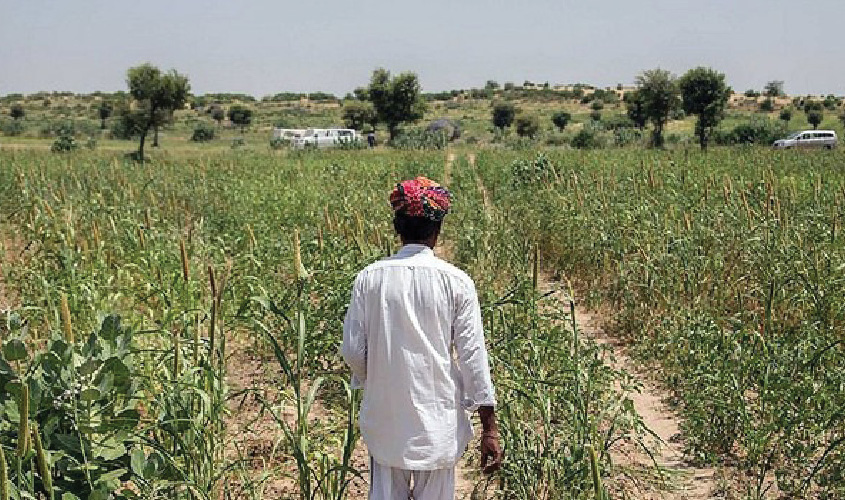The formal entry of BJP in Keezhattoor has brought the party in direct political confrontation with the ruling CPM, perhaps for the first time in the state.
The months-long agitation by a farmers’ collective to protect their precious farmland in north Kerala has turned political, with the BJP throwing a handful of soil from Nandigram, West Bengal, in the fields of Keezhattoor, a communist village in Kannur district. Launching a “Karshakaraksha Yatra” from this village early this week, one similar to the Janaraksha Yatra it took across the state last year, BJP made its intentions clear when its national secretary Rahul Sinha proclaimed that the struggle would “be the last nail in the CPM coffin” in Kerala as was the case a few years back in Nandigram. “Keezhattoor will not surrender”, the Sangh Parivar pledged, while vowing to stand by the farmers to the last. The villagers of Keezhattoor, under the banner of “Vayalkkili Samaram” have been fighting somewhat a lone battle for the past six months against forcible acquisition of their paddy fields for the construction of a bypass adjacent to the national highway. The ruling CPM, which has total control over the area, had initially supported the farmers’ movement. But it subsequently backed out, apparently under pressure from the ruling Left Front government, and started a violent campaign against the farmers, terming their agitation “anti-CPM and anti-development”. The party leadership even accused the framers of colluding with RSS-Jamaat-e-Islami and Maoists to dislodge the ruling CPM-led government. However, the farmers, mostly one-time party members or supporters, continued their struggle with support from environment activists, writers and the general public. Two weeks back, people from all over Kerala had assembled here, billed as “Kerala in Keezhattoor”, in solidarity with the farmers, a day after CPM had taken out a rally to show “people’s determination” to build the bypass.
The formal entry of BJP in Keezhattoor, whether to the liking of farmers and environment activists or not, has brought the party in direct political confrontation with the ruling CPM, perhaps for the first time in the state. Till now it was confined to politics of violence, not agitation on a mass scale. But no one needs to tell the party how a motley crowd of farmers in Nandigram in the long run made the communists bite the dust in West Bengal after 34 years. This has made the main opposition in the state, the Congress-led United Democratic Front, to rethink its position regarding the agitation. Congress and its main ally, Indian Union Muslim League, have been so far non committal towards the farmers. Only some leaders from both the parties, and their youth wings more actively, had visited the village, mostly on their own and not representing their political parties. The absence of Congress had given rise to questions regarding the role of the main opposition party in the farmers’ struggle, which was slowly gaining importance at the national level. For one, it involved construction of national highways which in turn is considered a barometer to development. For another it would lead to the destruction of precious agricultural land. The state Congress leaders had no definite answers to this and so it was believed that UDF was not in favour of the agitation. They seemed to have been trapped in the development syndrome. Even those who showed up at “Kerala in Keezhattoor” did not spell out either the party’s or the UDF’s stand. It took a fortnight after the march for the UDF to formally declare support to the agitation. Declaring it is not against development, the UDF said, using brutal force to suppress any people’s movement is not acceptable. It urged the government to look for alternatives such as flyovers, as suggested by the Shastra Sahitya Parishad, a left leaning think tank of Kerala.
By the time UDF managed to clear its confusion, BJP had already made its calculated political moves. Though the party knows its influence in the area is minimal, it understood the significance of the struggle at the national level much before the CPM. The party is sure to raise it as one of its electoral weapons in 2019. Rahul Sinha made it clear when he told the gathering that Prime Minister Narendra Modi and party president Amit Shah were with the agitators. BJP is in an advantageous position here. It can influence the National Highway Authority of India to come forward with alternative solutions. The party has already made moves in that direction. Land acquisition for any central project is a tough task for a government in a state like Kerala, which has limited land holdings thanks to the communists’ land reforms of the 1960s. Both UDF and LDG, which come to power every alternative five years, are victims of it. BJP need not worry about such a prospect since the party is not going to be in power in the state that soon. BJP obviously is looking for immediate political gains. By taking on the CPM in its own den, BJP had succeeded in bringing Kannur’s politics of violence to the national forefront last year. Now, the party knows that it is the turn of Keezhattoor’s “Vayalkkilis”. It is not for anything else that BJP has brought former communists to its podium there. There are parallel agitations elsewhere in the state too. Days ahead will show how far it succeeds in making inroads in the state.

